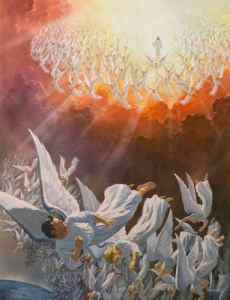Daily Lesson for Thursday 15th of May 2025
It seems incomprehensible that Lucifer once held the position of covering cherub, occupying an exalted position next to the throne of God. Surely his existence would have helped reveal the glory of God to the universe. Instead, he began to consider his own glory, not the glory of his Creator; or, to be more precise, he started to imagine that he was not being given the deference due to him.
Read Ezekiel 28:11-17 and Isaiah 14:12-14. What led to Lucifer’s downfall? Compare these passages with Revelation 14:1-12. How does the contrast between Lucifer’s fall and humanity’s high position in Christ inform your understanding of what takes place in Revelation 14:1-20?
Notice how Lucifer was removed from the holy mountain, while the redeemed stand on Mount Zion with the Lamb of God. Lucifer is said to have been in Eden; the human race was also once there, but in contrast to Satan’s fate, humanity is being restored to Paradise through Christ. (See Revelation 22:1-3.)
In this context, the following quote from Ellen G. White is very instructive: “Heaven will triumph, for the vacancies made in heaven by the fall of Satan and his angels will be filled by the redeemed of the Lord.”—Advent Review and Sabbath Herald, May 29, 1900.
And they are there, in heaven, only because of the gospel. In fact, the theme of the gospel, of redemption, is found in a graphic manner in the throne room in Revelation 4:1-11 and 5. For instance, the angels cry out: “ ‘ “You are worthy to take the scroll and to open its seals, because you were slain, and with your blood you purchased for God, persons from every tribe and language and people and nation” ’ ” (Revelation 5:9, NIV). What a picture of the gospel: the death of Jesus for the redemption of humanity!
Notice, too, how the language reflects the first angel’s message, in which we are called to preach “the everlasting gospel . . . to those who dwell on the earth—to every nation, tribe, tongue, and people” (Revelation 14:6, NKJV). What a powerful representation of the fullness of what Christ has done for the world. There is not a human being in all earth’s history for whom Christ has not died. Each person just needs to learn about it and choose to accept it.
|
What role do we have as a church, and as individuals, in letting people know about what Christ has done for them? |
 (0)
(0)



